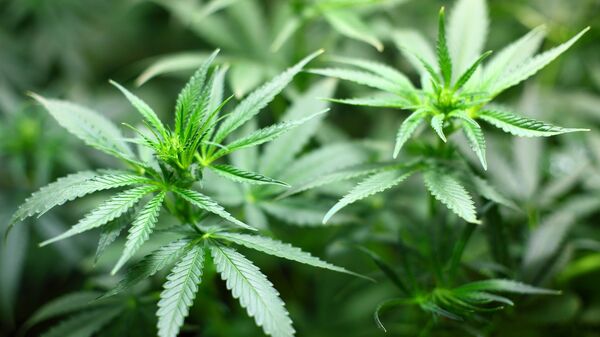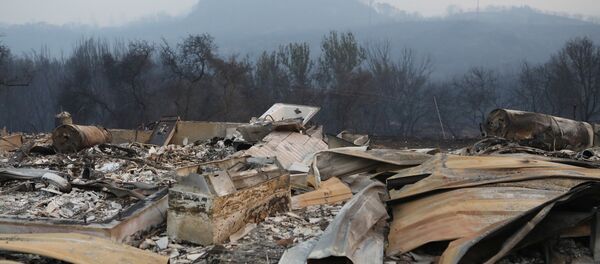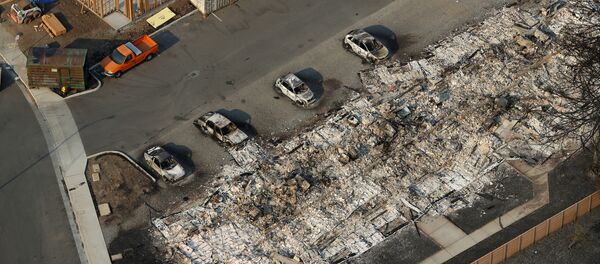The massive wildfires that erupted in California earlier this week have already brought disaster, and they're nowhere near contained. According to the latest reports, 32 people have perished in the fires, with hundreds more still missing.
But the flames have also taken crops, and in some cases entire farms. In particular, California's trademark wine grapes are dying in the fire, sometimes along with entire stocks of wine that is literally vaporized.
But there is also another crop — marijuana, which is legal in California — and it is also under threat by the wildfires. Talking to Eugene Puryear and Sean Blackmon of Radio Sputnik's By Any Means Necessary, Hezekiah Allen, executive director of the California Growers Association, explained the scale of the damage and how it would hurt growers, and those who rely on them. (The discussion starts at 17:10)
According to Allen, at least seven farmers are known to have lost their farms; another 30 to 40 farms are believed to have been lost. According to the California Cannabis Industry Association, there are about 10,000 to 15,000 farms across the state.
Those who have lost their farms may be permanently driven out of business, according to a New York Post report, since insurance companies simply do not deal with their product, which is still banned at the federal level.
For consumers that obviously means a shortage of supply and, consequently, a hike in price. The scale to which the market will be shaken cannot be estimated at this time, Allen acknowledges, but he remains certain that there will be changes, and it will only be possible to talk about them in a few weeks, as the market reacts.
There is also another, arguably greater problem, Allen says — smoke. Both grapevines and cannabis plants are affected by the smoke from burning buildings, and the contents of those buildings, including the chemicals they store, will be carried by the wildfire smoke and contaminate crops. The cannabis plants are probably the most affected, as they are "real sticky this time of year — at least if the growers have done a good job," Allen notes.
The problem is that there is are no standards regarding the safety and chemical makeup of cannabis in California. Despite the product being legal, the forbidding policy taken by the federal government for years has prevented the development of lab testing methods and standards.
Without a regulatory commission and its rules and enforcers, consumers are "much on their own," when it comes to determining a particular cannabis product's quality, Allen warns.
Luckily for consumers, according to Allen, contaminated pot is relatively easy to detect: it will have a characteristic "smoky campfire sort of smell," "not something little [that can] fly under the radar."
But problems remain. Aside from recreational use, cannabis is also used for medical purposes, and people who need cannabis for relief from extreme pain or other conditions will face a supply shortage thanks to the fires.
When it comes to cannabis use, particularly for medical purposes, it's not volume of supply that's so important, but variety. The different strains have very different effects.
According to Allen, cannabis is a "very diverse plant."
"There are more varieties of cannabis than of wine grapes," he says.
Some varieties are necessary to treat specific illnesses. One variety, for example, relieves the seizures of pediatric epilepsy. That particular variety was completely destroyed, along with the single farm that grew it, by wildfires in 2015, leaving about a dozen kids in a "very, very dire situation" until the Grower's Association managed to find another supply of that specific variety elsewhere.
During his presidential campaign, US President Donald Trump said that states should be allowed to decide about recreational and medical cannabis for themselves. He somewhat backed off from those statements after the election, with former White House spokesman Sean Spicer saying that "medical use [is] very different from recreational use, which is something the Department of Justice will be further looking into."
And yet, the administration has not initiated any punitive campaigns against growers. According to Allen, even if things will get rough, the State of California is on the growers' side. And the law enforcement system, from police to judges, has started to "shift its approach."
"It has a potential to become […] groundbreaking in terms of state-federal interaction, so we will see what comes of it," he concludes.







